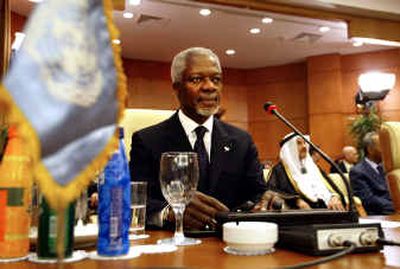Annan’s son paid until this year

UNITED NATIONS – The son of Secretary-General Kofi Annan received payments from a firm with a U.N. Iraqi oil-for-food contract more than four years longer than the world body previously admitted, the U.N. spokesman said Friday.
Spokesman Fred Eckhard said the panel investigating alleged corruption in the oil for food program has been told by Kojo Annan’s lawyer about the payments.
“There is nothing illegal in this,” Eckhard said of the payments from the Swiss firm Cotecna. However, it was an embarrassing moment for the United Nations to have to admit that its earlier information was wrong.
Eckhard said that Kojo Annan’s attorney told him that the younger Annan “continued to receive monthly payments beyond the end of 1999, when we previously thought they had ceased, through February 2004.”
Eckhard acknowledged that the United Nations previously said that Kojo had stopped receiving monthly payments at the end of 1999.
Eckhard explained that Kojo worked under an open-ended no-compete contract, meaning when an employee leaves a company, he can receive payments to assure he won’t set up a competing company doing the same work as the employer.
The oil-for-food program, instituted to help Iraqis cope with sanctions, began in December 1996 and ended in November. In the program’s seven years, Iraq exported $65 billion of oil and some $46 billion of that revenue went to the oil-for-food program.
Saddam Hussein’s government determined which goods it would buy, who would provide them and who could buy Iraqi oil.
Cotecna, the firm which employed Kojo Annan, was hired to verify that the goods that were purchased actually reached Iraq.
Allegations of corruption in the program surfaced last January in the Iraqi newspaper Al-Mada and have intensified in recent months, calling into question the U.N.’s credibility and causing what Annan called “a very serious” crisis.
The paper listed about 270 former government officials, activists, journalists and U.N. officials from more than 46 countries suspected of profiting from oil sales.
The program is the subject of a wide-ranging investigation by a three-member panel headed by former U.S. Federal Reserve chairman Paul Volcker.
Eckhard said the Volcker inquiry has been made aware of the discrepancy about the payments to Kojo, and it is up to Volker to explain it. “This is in Volcker’s hands,” Eckhard said. He said Kofi Annan was told of the discrepancy on Tuesday.
The spokesman stressed that U.N. officials “who gave Cotecna the contract had no idea that Kojo Annan worked for Cotecna, and that continues to be our belief.”
Annan has said his son joined Cotecna at the age of 22 as a trainee in Geneva before Annan became secretary-general and worked in West Africa, mainly in Nigeria and Ghana.
“Neither he nor I had anything to do with the contracts for Cotecna,” Annan said on April 28. “That was done in strict accordance with U.N. rules and financial regulations, and these are also part of the issues that the (Volcker) panel … will look into.”
In an April statement, Cotecna said Kojo Annan’s full-time employment – which focused entirely on its activities in Nigeria and Ghana – began in 1995 and ended in December 1997 after which he was retained as a consultant until the end of 1998.